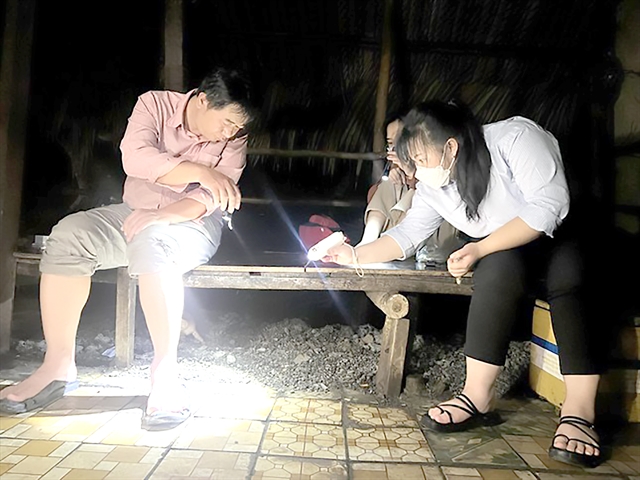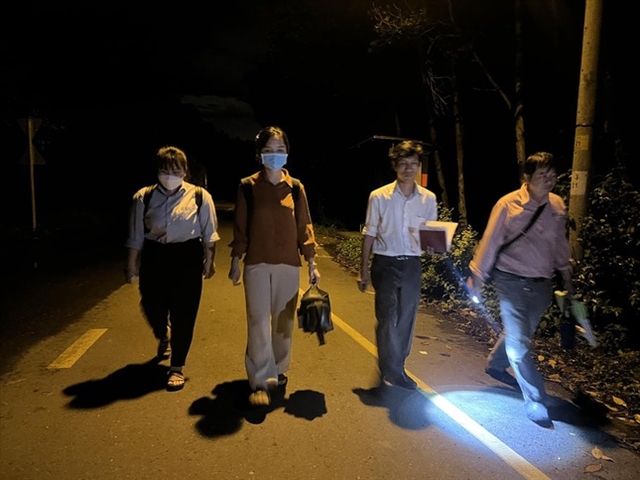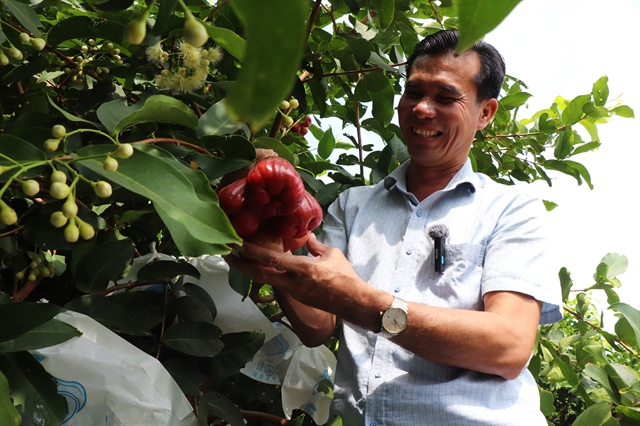 Society
Society

 |
| Healthcare workers of the Acute Infectious Disease Prevention and Control Department catch mosquitoes in a forest in Cần Giờ District. — Photo tienphong.vn |
HCM CITY — To catch mosquitoes for seasonal research, healthcare workers of the Acute Infectious Disease Prevention and Control Department under HCM City Centre for Disease Control (HCDC) have to let mosquitoes land on their legs at night, a technique called ‘human landing catch’.
Mai Xuân Phán, the department’s deputy head, said at some places which used to be malaria hot spots such as Nhà Bè and Cần Giờ districts, mosquitoes need to be monitored every month. The aim is to monitor the fluctuations of mosquito populations, and alert local people and specialised agencies to seek solutions to eliminate mosquitoes every new season.
That’s why healthcare workers collect mosquitoes for research every month. They have been called ‘human volunteers’.
Traveling one and a half hours from the city centre to a protective forest in An Thới Đông Commune, Cần Giờ District, the volunteers were ready for their night task.
At 8pm, the forest was completely empty, with the only light that of their torches.
Test tube, cotton wool and torches are all the equipment they need to embark on the mosquito hunt.
 |
| Healthcare workers of the Acute Infectious Disease Prevention and Control Department enter the forest at 10pm to catch mosquitoes. — Photo tienphong.vn |
Three healthcare worker volunteers, sitting in different areas of the forest, rolled up their pantlegs and just waited. All the lights were turned off, in the darkness no one talked or moved; there was only the sound of mosquitoes buzzing continuously.
In less than a minute, dozens of mosquitoes clung to the staff members' legs.
Trần Thúy Loan, a 23-year-old staff member, used a test tube to catch the mosquitoes on her legs and used cotton wool to close the tube.
Loan, one of only two female employees of the mosquito catching team, is used to working as a mosquito collector, having done it every week for nearly a year.
Starting with just curiosity and willingness to try it, now Loan has “fell in love" with the task, she said.
“My parents at first were quite worried about this task, but I could convince my family with specific knowledge. I find this a meaningful job. As long as I'm still a HCDC employee, I will continue to volunteer to catch mosquitoes,” she told Tiền Phong (Vanguard) newspaper.
Trần Đăng Khoa, a male staff member, said with more than 10 years of experience, he only needs a quick look to know which type of mosquito transmits malaria so he can catch them correctly.
"There were many days when I was bitten a lot but there were no mosquitoes in the group that needed to be captured. The captured mosquitoes must be alive, without broken legs or wings for identification and sample analysis,” he said.
Medical staff said that there are many other ways to hunt mosquitoes such as lamp landing, searching on walls or catching in livestock barns, but human landing is the most natural and accurate way to assess mosquito density and preference for biting humans. Mosquitoes are most active in the evening, so the catching time is usually from 7.00pm to 10.00pm.
The mosquito collectors stand a high risk of malaria and dengue fever. To prevent diseases, medical staff have to take medicine first.
Healthcare workers of the Acute Infectious Disease Prevention and Control Department said they get used to the itching so they feel less uncomfortable.
They feel fortunate that so far they are still healthy enough to continue the work. However, that does not mean they should be negligent about protection.
Phán said funny accidents sometimes happen to them, like being chased or bitten by dogs.
“The hardest task is exposing skin on cold days to catch mosquitoes. There was a day when we travelled dozens of kilometres then it rained all night and the catching plan collapsed,” he said.
HCDC's insect team, with seven people aged 21 to 44 years old, is usually divided into two groups starting to travel from 4.00pm and working until dawn the next day.
There are strict regulations that collectors must comply with.
On the afternoon before for the night of catching, they are not allowed to bathe with scented soap, use perfume, apply oil or smoke, which can prevent mosquitoes from coming closer.
Dr Lý Huỳnh Kim Khánh, in charge of the Department of Entomology and Animal Medicine at HCM City Pasteur Institute, said that catching mosquitoes in the medical and population fields now has two main activities: mosquito capture in dengue fever prevention and malaria prevention.
According to the instructions of the Ministry of Health, catching mosquitoes for dengue fever prevention is mainly done during the day, while for malaria prevention, mosquitoes are caught at night. The general purpose of mosquito capture activities is to determine the species composition, density and evolution of mosquito population indicators over time at monitored points to provide timely and effective prevention measures, she said. — VNS




